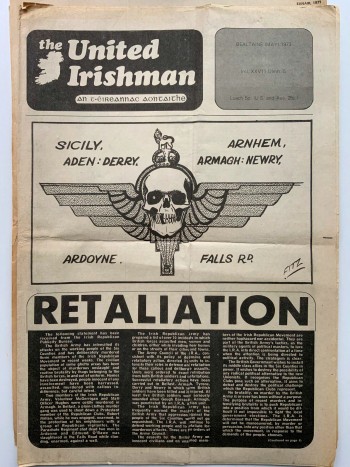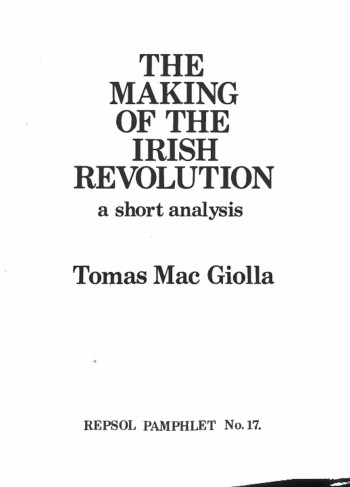Fianna Fáil and the IRA

| Date: | 1972 |
|---|---|
| Organisation: | Sinn Féin [Official] |
| View: | View Document |
| Discuss: | Comments on this document |
| Subjects: |
Please note: The Irish Left Archive is provided as a non-commercial historical resource, open to all, and has reproduced this document as an accessible digital reference. Copyright remains with its original authors. If used on other sites, we would appreciate a link back and reference to The Irish Left Archive, in addition to the original creators. For re-publication, commercial, or other uses, please contact the original owners. If documents provided to The Irish Left Archive have been created for or added to other online archives, please inform us so sources can be credited.
Commentary From The Cedar Lounge Revolution
17th March 2008
Now here is an historic document, and one you'll find, should you be interested, in the National Library (Books and Periodicals Ir Ir 300 ).
It covers a lot of ground as regards the relationship between Fianna Fáil and various incarnations of the IRA. And predictably that relationship is painted - broadly speaking - in an unfavourable light. But it is in the late 1960s that it coms into sharp focus. Here the charge is that elements within Fianna Fáil attempted a 'take-over' of the Civil Rights movement in the North, and the Citizens Defence Committees, and in doing so assisted in the birth of the Provisional IRA.
A lot depends in this analysis of whether one can offer any credence to the idea that various parties within the government were clued up enough to act so decisively strategically as regards the IRA. I'm sceptical, but open-minded, on that point. Sceptical if only because it seems to reify the influence of the named Ministers to a seemingly implausible degree on a section within the IRA during a time of massive confusion. And it also serves to increase and exaggerate the influence of SF and the IRA to a perhaps incredible level. Sure, there were those within the state apparatus who saw a Marxist oriented IRA as a threat to social order, but surely that was lower on the list of priorities than other issues... Furthermore, even if true, this cannot ignore the structural issues which led to the split in the IRA and Sinn Féin which long predated any interventions from outside.
Or indeed a complete sincerity on the part of many both within and outside Fianna Fáil during the period who thought they were facing some sort of apocalypse north of the border. The rather cynical spin that the document puts on it may in some respects be accurate, but it is far from the full story. But then, in fairness, by the time this was published (c. 1972) the Officials had seen a shift away from them in terms of support and influence in a manner which in some respects must have seemed all but inexplicable for they with a Marxist programme were the future, were they not?
And incidentally, this version of a muscular 'nationalist' interventionism on the part of FF and others is interesting in itself, because it surely marks the only serious effort on that part since Michael Collins sent material north to the IRA during the Civil War. One might make ones own assessment of the efficacy or otherwise of such interventions, and indeed the cheerleading in this instance of certain sections on the further left who eschew all foreign entanglements.
Incidentally, one wonders whether this sort of attitude to Fianna Fáil was instrumental in the curious sight of generation after generation of former Sinn Féin members (or their political formations) ultimately dealing with Fine Gael to gain a measure of state power. From MacBride onwards we see a pattern emerge. Was this in some respects a response to the executions during the Emergency, a deep rooted sense of 'betrayal' by those who were seen as Republicans or was it simply the result of political competition within a small polity where the larger party was in an hegemonic position?
Anyhow, surely a moot question - until the next time Sinn Féin or split thereof does the deal!
A final couple of thoughts on this matter. The previous evolution of the IRA is presented in relatively uncritical terms and the 'Republican' thrust is taken as given. But then, how could it be otherwise when a core element - in addition to the new leftwards shift - of the legitimacy of those involved in this SF was based on their credentials in previous episodes of activity. The quality of this is quite poor, particularly when compared and contrasted with other material from Official Republicanism. But then, perhaps, despite the copious quotes from Goulding et al this was meant to be a little bit at arms length. No harm then in not having a place of publication. A sort of samizdat from the Officials - as it were. Telling.
More from Sinn Féin [Official]
Sinn Féin [Official] in the archive




Comments
No Comments yet.
Add a Comment
Comments can be formatted in Markdown format . Use the toolbar to apply the correct syntax to your comment. The basic formats are:
**Bold text**
Bold text
_Italic text_
Italic text
[A link](http://www.example.com)
A link
You can join this discussion on The Cedar Lounge Revolution
By: Dr.Nightdub Sun, 04 Mar 2012 17:52:39
Were there different editions of this pamphlet?
I followed a link to here from politics.ie, intending to clarify that the publication date was March 1973 – based on a clipping from the Sunday News of 18th March 1973 which talked about the pamphlet “due to be releaswed next week”; my da had attached this clipping to his copy.
Hoewever, it turns out what I have is an entirely different article to the pdf posted above – my da’s copy is an A5 pamphlet entitled Fianna Fail The IRA Connection, which has a different cover (no pics of Jack Lynch) and runs to 68 pages, as opposed to the pdf’s 29 pages. The text is completely different as well, though the basic thrust is the same.
Can anyone throw any light on this?
Reply on the CLR
By: Brian Hanley Sun, 04 Mar 2012 21:53:22
There were two different pamphlets. ‘FF-The IRA Connection’ is the more detailed and blow by blow account, the above more polemical and lighter on detail. Both were produced by the Officials but with no authors names given. There were all sorts of rumours about the authors- Dick Walsh of the Irish Times being one name bandied about. The Department of Justice 2000 releases has a file with reports relevant to this debate, as do some letters written by Peter Perry, also in the National Archives. I haven’t the file refs to hand but can find them if you need them.
Reply on the CLR
By: WorldbyStorm Sun, 04 Mar 2012 23:24:45
In reply to Dr.Nightdub.
Dr. Nightdub, I’d be very interested in that doc for the archive if it isn’t already available elsewhere…
Reply on the CLR
By: WorldbyStorm Sun, 04 Mar 2012 23:25:27
In reply to Brian Hanley.
Thanks Brian. Dick Walsh? Was he that close to the party?
Reply on the CLR
By: Brian Hanley Mon, 05 Mar 2012 20:35:31
Yes, Walsh was asked for advice on various things and I believe wrote part of the ‘Carrickmore’ speech delivered by Mac Giolla in 1972.
(That should be Peter Berry above)
Reply on the CLR
By: WorldbyStorm Mon, 05 Mar 2012 20:51:10
In reply to Brian Hanley.
Presumably not Peter Perrett!
Interesting, I knew he was sympathetic, but that’s way beyond sympathy.
Reply on the CLR
By: SF/IRA why not FF/IRA - Page 15 Wed, 20 Mar 2013 16:55:47
[…] to dampen the influence of the "Marxists" who were taking over the IRA at the time… The Left Archive: “Fianna Fail and the IRA” (from the Official Republican Movement) c. 1… Who do you think armed the Provos Tonic… the Provo's themselves admit that when the first […]
Reply on the CLR